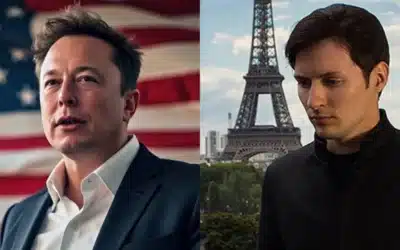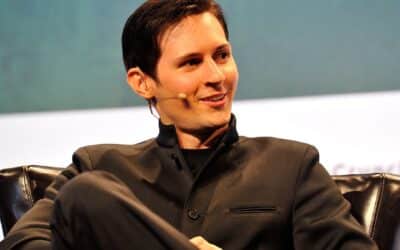Telegram is a messaging service launched in 2013 by Pavel Durov. Starting with 100,000 users in its first year, Telegram now has 950 million monthly active users. In 10 years, Telegram has grown into a giant in terms of its user base.
Who is Pavel Durov?
Pavel Durov is a Russian citizen who initially founded VK, the largest Russian social network. In 2012, he sold part of VK and then resigned in April 2014 after refusing to provide the Russian authorities with the data of Maidan protesters in Ukraine, who were also VK users. Fearing for his business, he moved to Dubai where he founded Telegram. He also acquired the nationality of several countries, including Saint Kitts and Nevis (two Caribbean nations) and France, though the circumstances of the latter raised suspicions. Durov’s fortune comes from the sale of VK as well as from wise investments in Bitcoin. His career has largely contributed to the image of Telegram as an app that refuses to cooperate with authorities and guarantees a space for uncensored exchanges.
Why such a craze?
Telegram is known for being reliable, fast, and offering one of the best user interfaces available. Its internal search engine is unparalleled. The app quickly gained popularity in several countries, particularly in Eastern Europe and countries with regimes that readily censor networks. Telegram has earned a reputation as a messenger that resists censorship. It is especially popular in Russia, Iran, and India. Pavel Durov’s low profile, the unmatched software quality, and the app’s effective resistance to censorship have made it the default choice for many users. The ability to add autonomous agents and manage groups where members remain invisible has facilitated the development of many services, both legal and illegal, and even criminal. Telegram is notably used for drug trafficking. However, it is important to note that, beyond its dubious uses, Telegram is also a crucial source of major world news. For example, users can follow Israeli army units, Hamas militants, or Ukrainian battalions giving updates on the war. It serves as both a propaganda tool and a powerful professional tool, highly valued in finance and tech circles.
Is it really safe?
This is where the problem lies. Telegram has long been criticized by experts for its lack of encryption. Unlike Signal or WhatsApp, which encrypt chats automatically, Telegram’s encryption feature must be activated manually. Most users don’t activate it. As a result, groups are not truly encrypted. Beyond encryption, it’s worth noting that Telegram’s entire infrastructure is centralized under the control of a small team of engineers, allowing them to ensure unparalleled service quality.
Telegram has prioritized the user experience, which remains unique, ensuring greater security and decentralization. Although Telegram’s teams have always denied access to authorities, there is no doubt that they have access to the conversations and could provide moderation if they chose to.
What is its business model?
The app is free, but Telegram recently introduced a paid model, “Telegram Premium,” offering additional features to over 5 million customers. Even more recently, Telegram has enabled the development of mini-apps within its ecosystem. As of February 2024, Telegram’s revenue was estimated at $6.1 million per month.
Before introducing monetization to finance its operation, the platform launched its own cryptocurrency, “TON.” Like Facebook’s Libra currency, Pavel Durov wanted to create an independent ecosystem with its own cryptocurrency. However, unlike Libra, which sought regulatory validation, Telegram organized a massive fundraising campaign and was sanctioned by the SEC (the Securities and Exchange Commission is the US market authority). As a result, investors had to be reimbursed. Nevertheless, the “TON” cryptocurrency, developed by Pavel’s brother Nikolai Durov, was eventually launched. While easily usable on Telegram, it now operates as a separate company.
Telegram: The Bad Boy That Grew Too Big?
Thanks to its infrastructure and attitude, Pavel Durov and his team were able to resist the demands of various national authorities for a long time. Their security was robust, providing effective protection for millions of users worldwide. But by growing too large and attempting to develop his own currency, Pavel Durov’s room for maneuver quickly narrowed. In a rare exercise in communication, he recently shared his vision in a long interview with Tucker Carlson (American columnist and television host).
As in a final act of defiance, he affirmed that he would not bow to authorities’ demands to moderate the platform, claiming his finances were strong enough to continue operating even in adversity.
A few months later, he was arrested in Paris for failing to cooperate and for not having imposed moderation on the platform. But the technical reality is unavoidable: because of its automatic non-encryption and its centralization, Telegram can be moderated. In fact, the position of the platform, which no longer appears to be protected by its founder, has evolved. It has already started to give in.
As proof for instance, while nearly half of Ukraine’s population uses Telegram for information, and the app has played a key role in the evacuation and mobilization of civil society during the war, the country’s military authorities banned all civil servants and military personnel from installing Telegram on September 20, 2024, due to security concerns. Authorities reportedly have sufficient evidence that Russian secret services have access to Telegram correspondence.
This is just a warning sign. On September 23, Telegram announced its intention to comply with moderation requirements and to share connection data as required.
Telegram’s future is not at risk—this app remains useful. However, the landscape of messaging software is bound to evolve towards more fragmentation, increased encryption, and greater decentralization. In their efforts to control Telegram, public authorities may unfortunately find themselves dealing with a proliferation of new messaging services that will be much harder to regulate. This is a situation to monitor closely.



